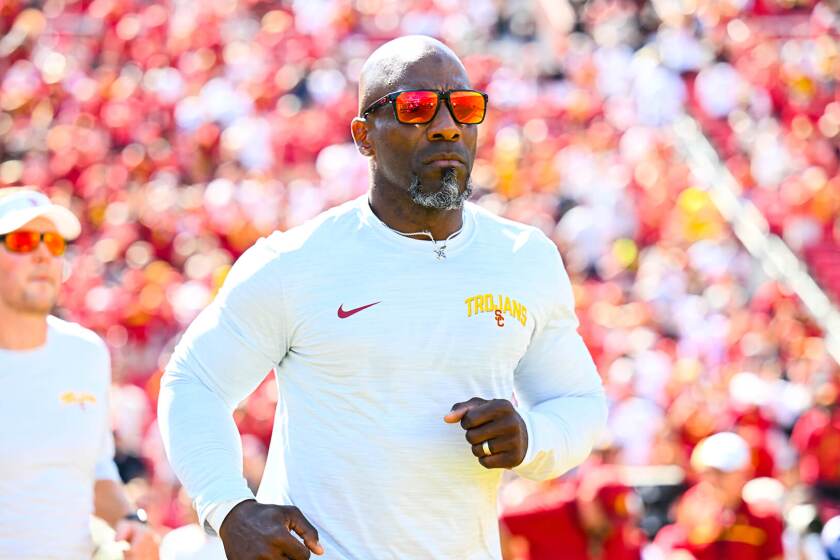Ambrose Schindler followed his own road to success at USC and beyond
- Share via
Ambrose Schindler, player of the game in the 1940 Rose Bowl, inspired one of the most delightfully alliterative nicknames in USC football history: Amblin’ Amby.
Later, daringly darting through freeway traffic, Amby drove a Jaguar with a vanity license plate reading: X USC QB.
“People would pass me, honk their horns and give me the two-finger SC salute,” he told friends. “If they gave me one finger, I knew they were from UCLA, or maybe Notre Dame.”
These days, though, Schindler’s movements are limited to leisurely strolls through his Redondo Beach neighborhood.
He is 94.
He no longer surfs or bicycles, favorite pastimes of the longtime beach resident, but on good days he’s still pretty sharp.
“His short-term memory is terrible,” says his 61-year-old son, Charlie, “but when he’s clear he can tell you the plays he called in the huddle at the Rose Bowl. …
“He’ll remember every play, every call. It’s just amazing.”
In Schindler’s living room, a visitor gestures toward a large framed photo from the 1940 Rose Bowl. It shows an unsuspecting Tennessee defender bearing down on Schindler as the determined Trojans ball carrier charges toward the goal line.
“He got hit,” Schindler says, laughing.
The points were the first scored against Tennessee in 16 games, sparking the co-national champion Trojans to a 14-0 victory that ended the Volunteers’ 23-game winning streak.
Schindler later passed for the Trojans’ other touchdown, prompting Paul Zimmerman of The Times to write that the San Diego native had “stubbornly smashed and slid and scooted through the southern soldiers so thoroughly that we can mighty near forget Sherman’s march to the sea.”
Eight months later, in the College All-Star game at Soldier Field in Chicago, Schindler was “up to his old tricks” again, Time magazine noted. He scored two touchdowns and was named MVP after helping a team of former college stars nearly upset the defending NFL champion Green Bay Packers.
Time, in its game report, called Schindler a “superstar” who had “spurned all offers to play pro football.”
Schindler by then had launched a fledgling film career, serving most notably as the stunt double for actor Jack Haley (the Tin Man) in “The Wizard of Oz.”
In one scene, which of course had to be reshot, an overly exuberant Schindler pulled loose the Cowardly Lion’s tail as they climbed toward a mountaintop castle to rescue Dorothy from the Wicked Witch of the West.
“Every time you see the Tin Man in a compromising, risky situation, i.e. climbing that mountain, that’s my dad,” Charlie Schindler notes. “They used strong, in-shape young jocks before there were such things as professional stunt doubles.”
Schindler calls his stunt work “a lot of fun,” but he spurned Hollywood too, opting for a career in coaching.
“I had an offer to coach a high school team,” he says of his first job out of college, at Glendale High, “so I decided I wouldn’t fool around with professional football.”
It was a decision that gnawed at him even as he moved into a long career as a coach and instructor at El Camino College after serving in the Navy during World War II.
“It was always on my mind,” he says.
But coaching, Schindler notes, offered more financial security than the low-paying NFL of the early 1940s.
“It was at a time when I was going with a certain young lady,” he says, “and I expected for us to get married.”
He and wife Lucille, parents of a son and daughter, were married nearly 40 years before she died in 1984.
His son is grateful that Schindler never played pro football because “he already had suffered way too many concussions … to where he still has stroke-like symptoms. And his older sister is sharp as a tack, strong as an ox. She never played football.”
In addition to coaching and teaching, Schindler also was a longtime football game official, working for years in the AFL and later officiating high school and college games.
He was always active.
“He’d still be surfing today if he was in good enough health,” his son says. “He surfed in Hawaii until he was damn near 75.”
Schindler, a team leader to the end, helped lobby USC for years to publicly recognize the 1939 Trojans as national champions. He and his teammates, enlisting longtime sportswriter Loel Schrader to prepare a written argument, noted that USC topped a highly regarded but now-defunct major poll that season.
In 2004, nearly 65 years after their last game together, the surviving ’39 Trojans were finally honored at the Coliseum.
Schindler was there that day but he no longer attends games, citing the hassle of fighting through crowds.
“All that hustle and bustle walking to and from the stadium is too much for me,” he says.
Most of his ambling, in other words, is limited to his living room. His Jaguar is driven by a grandson.
He had a knee replaced years ago, a shoulder more recently.
“I’ve had a lot of injuries,” he says. “Ball carrier, you know.”
More to Read
Go beyond the scoreboard
Get the latest on L.A.'s teams in the daily Sports Report newsletter.
You may occasionally receive promotional content from the Los Angeles Times.






